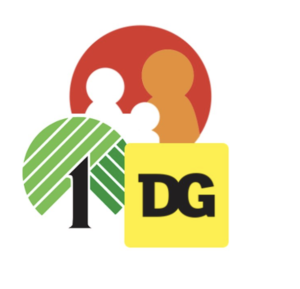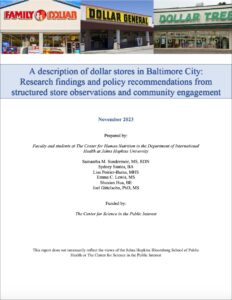Dollar Store Project

Overview
Dollar Stores have become pervasive retailers in both rural and urban settings. There are over 35,000 Dollar Stores in the U.S. as of 2021, with many located in low-income urban neighborhoods of color. Dollar Stores usually sell some food items, but typically sell no fresh produce, instead primarily offering ultra-processed, high -fat, -sugar, and -sodium foods.
There are over 50 Dollar Stores in Baltimore City located in areas with existing low food access and low healthy food availability. This poses a public health opportunity for leveraging these existing food retail sources as positive change agents within local communities.
Policies are being increasingly explored as means of controlling the spread of Dollar Stores, including dispersal and shelf/floor space regulations. Maryland State Senate Bill 869 which was passed in the Spring of 2022 requires Baltimore City to conduct a study of Dollar Stores to inform potential policies.
In collaboration with state, city, and community partners, we will study Dollar Stores in Baltimore City in terms of the food environment (i.e., food and beverage availability, price, and quality) within stores, how the community views and utilizes this store type, and the impact of Dollar Store proliferation on other local retailers.
This work will be used to co-generate new Dollar Store policies in collaboration with our project partners to propose to City Council.
Goals/Aims
November 2023 Report
Read more about dollar stores in Baltimore City in our recent report titled A description of dollar stores in Baltimore City: Research findings and policy recommendations from structured store observations and community engagement. This report was shared with Baltimore City Council Members and Maryland State Senator Mary Washington, and outlines our key research findings and policy recommendations.
Report Aims
The project was guided by the following aims:
Approach
To accomplish this, we employed a mixed-methods approach across four study phases from October 2022-August 2023:
Staff
If you would like the data collection forms please email Joel Gittelsohn.






